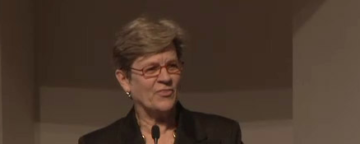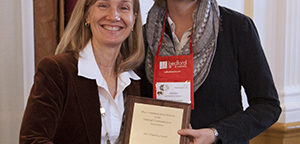A 2004 National Annenberg Election Survey question on whether the name of the Washington Redskins is offensive to Native Americans is in the news amid renewed national debate over whether the pro football team should change its name.
Nursing intervention helps mentally ill people with HIV
Having trained nurses follow up on medication use with mentally ill patients who are HIV positive was effective both at improving the patients’ quality of life and biological markers for the human immunodeficiency virus, according to a new study from researchers at the University of Pennsylvania. The study is thought to be the first to
Study: Cigarette pack warnings more effective combining text and images
Cigarette-pack warning labels that combine graphic images with lengthier explanations of the dangers of smoking were found to be more effective than images or brief warnings alone at convincing smokers to consider quitting, a new study has found. The study, by researchers at the Annenberg Public Policy Center at the University of Pennsylvania and at

Kathleen Hall Jamieson Delivers Sackler Keynote on Science Communication
What are the roles of scientists and journalists as “custodians of the knowable” and what happens when they get it wrong? How do they insulate themselves from charges of ineptness or partisanship? Kathleen Hall Jamieson, director of the Annenberg Public Policy Center, delivered the keynote lecture on Sept. 24 at the National Academy of Sciences’
Annenberg Classroom documentary garners awards
Annenberg Classroom’s documentary “Search and Seizure: Mapp v. Ohio” has been chosen for a Chris Statuette award, to be presented in November at the 61st annual awards ceremony of the Columbus International Film + Video Festival. The 25-minute film, produced by The Documentary Group, explores the landmark Fourth Amendment case in which the U.S. Supreme
Issue brief: Drug Prevention in Schools
Dan Romer, director of APPC’s Adolescent Health and Communication Institutes, reviews the evidence on ways to prevent drug abuse in middle and high school youth, focusing on mandatory random drug testing. Since the 1990s, interest has been growing in the use of such tests to deter drug use among teenagers. The review finds that mandatory
More than half of Philadelphia parents who smoke and have young children allow smoking in the home
In a city with high smoking rates, 52 percent of smokers with pre-teen children in their households said they permit smoking at home, a new study has found. The study, by researchers at the Annenberg Public Policy Center and the Philadelphia Department of Public Health, also suggested that certain antismoking messages, including a focus on
Report: Congress Could Make America Safer
On the 12th anniversary of the 9/11 terrorist attacks, a bipartisan task force of homeland-security experts, government officials and former members of the 9/11 Commission has released a report outlining the need for stronger and clearer Congressional oversight of national security.

Amy Jordan awarded NCA teaching honor
Amy Jordan, Ph.D., associate director of the Annenberg Public Policy Center, has been awarded a top teaching honor from the National Communication Association. Dr. Jordan was presented with the 2013 NCA Mass Comm. Division Teaching Award, honoring her “dedication and commitment to excellence in teaching and mentoring,” at the NCA’s 99th annual convention in Washington,
Parents’ TV Viewing Habits Influence Kids’ Screen Time
The amount of time that children and teens spend watching television may have more to do with their parents’ TV habits than with family media rules or the location of TVs within the home, according to a study in the August 2013 issue of Pediatrics, “The Relationship Between Parents’ and Children’s Television Viewing,” published online